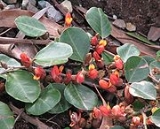
Gastrolobium minus
Encyclopedia
Gastrolobium minus, also known as Broad-leaved Brachysema, is a prostrate shrub
which is endemic
to the south-west
of Western Australia
. It is a member of the family Fabaceae
and of the genus Gastrolobium
, which contains many toxic species, however the toxicity of this species is unknown.
and Cranbrook
, with an outlying population in Fitzgerald River National Park
.
The plant may be used as a groundcover on embankments or in large containers or hanging basket
s. It prefers light shade and good drainage, and is somewhat frost-tolerant.
Prostrate shrub
A prostrate shrub is a woody plant, most of the branches of which lie upon or just under the ground, rather than being held erect as are the branches of most trees and shrubs....
which is endemic
Endemic (ecology)
Endemism is the ecological state of being unique to a defined geographic location, such as an island, nation or other defined zone, or habitat type; organisms that are indigenous to a place are not endemic to it if they are also found elsewhere. For example, all species of lemur are endemic to the...
to the south-west
Southwest Australia
Southwest Australia is a biodiversity hotspot that includes the Mediterranean forests, woodlands, and scrub ecoregions of Western Australia. The region has a wet-winter, dry-summer Mediterranean climate, one of five such regions in the world...
of Western Australia
Western Australia
Western Australia is a state of Australia, occupying the entire western third of the Australian continent. It is bounded by the Indian Ocean to the north and west, the Great Australian Bight and Indian Ocean to the south, the Northern Territory to the north-east and South Australia to the south-east...
. It is a member of the family Fabaceae
Fabaceae
The Fabaceae or Leguminosae, commonly known as the legume, pea, or bean family, is a large and economically important family of flowering plants. The group is the third largest land plant family, behind only the Orchidaceae and Asteraceae, with 730 genera and over 19,400 species...
and of the genus Gastrolobium
Gastrolobium
Gastrolobium is a genus of flowering plants in the family Fabaceae. There are over 100 species in this genus, and all but two are native to the south west region of Western Australia....
, which contains many toxic species, however the toxicity of this species is unknown.
Description
The plant grows to about 1 metre in diameter and has leaves that are oval in shape with a dark green upper surface and a silky undersurface. The flowers appear predominantly between July and October in the species native range. These are orange-red with a standard that has recurved margins and yellow markingsDistribution and habitat
The species occurs in open Jarrah (Eucalyptus marginata) forest near Mount BarkerMount Barker
Mount Barker may refer to one of two towns in Australia:* Mount Barker, South Australia* Mount Barker, Western AustraliaMount Barker may also refer to one of the following:...
and Cranbrook
Cranbrook, Western Australia
Cranbrook is a small town in the Great Southern region of Western Australia between Katanning, Kojonup and Mount Barker, situated 320km south of Perth. It is billed as "The Gateway to the Stirlings", referring to the nearby Stirling Range National Park...
, with an outlying population in Fitzgerald River National Park
Fitzgerald River National Park
Fitzgerald River National Park is a national park in Western Australia , southeast of Perth, in the Shire of Ravensthorpe and the Shire of Jerramungup....
.
Culivation
The species has been popular in cultivation for many years, often distributed under the incorrect name of Brachysema latifolium.The plant may be used as a groundcover on embankments or in large containers or hanging basket
Hanging basket
A hanging basket is a suspended container used for growing decorative plants. Typically they are hung from buildings, where garden space is at a premium, and from street furniture for environmental enhancement. They may also be suspended from free standing frames sometimes called hanging basket trees...
s. It prefers light shade and good drainage, and is somewhat frost-tolerant.

